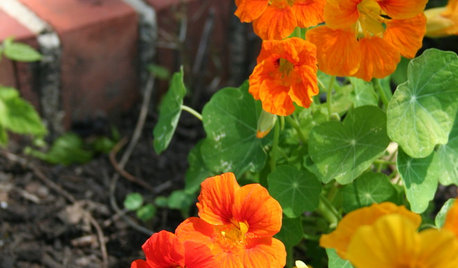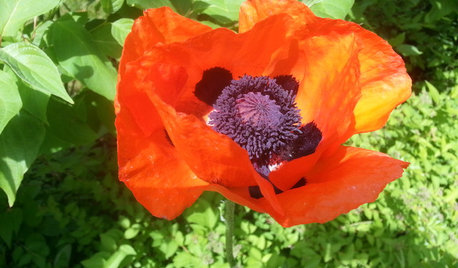Clearing Roundup from Soil
My husband and I just bought a new house with a nice big lawn. We're planning to pull up a bunch of the grass to make room for a vegetable and flower garden. To our dismay, when we mentioned this to our neighbor, she informed us that the previous owner was an assiduous user of Roundup Weed Killer and had sprayed it over the entire lawn.
I've now read that Roundup becomes "inactivated" when it hits the soil, and so shouldn't affect the growth of our flowers. However, I'm still worried about growing edibles in soil that was treated with this stuff. Is there a specific soil test that I should request to check for this toxin or other common pesticides/herbicides? Does anyone know whether it is safe to grow food in my soil? I'm not really worried about being "certified organic" since I won't be marketing any of my veggies, but I certainly want it to be safe and nutritious for my family and any friends who would eat this food.
Any tips would be greatly appreciated!
Comments (47)
Lloyd
14 years agoAnything labeled with Roundup would be a non-selective herbicide (meaning it is intended to kill just about everything it is sprayed on) so I wonder about the neighbors information. If the lawn was sprayed with Roundup, it oughta be dead.
Glyphosate products are used extensively in agriculture.
Lloyd
Dan _Staley (5b Sunset 2B AHS 7)
14 years agoYes, one does not spray RoundUp on the lawn. Now you need to hope you can ID the chemical and go from there. You might want to pay the money and send to a decent lab and see if they can find it, but you and the fam will be skipping a dinner out if you go this route.
Dan
Related Professionals
Glendora Landscape Architects & Landscape Designers · Hartford Landscape Contractors · Stoughton Landscape Contractors · Wakefield Landscape Contractors · Burien Landscape Contractors · Fort Worth Landscape Contractors · Fruit Heights Landscape Contractors · Los Banos Landscape Contractors · Merced Landscape Contractors · Middleton Landscape Contractors · New Providence Landscape Contractors · Wareham Landscape Contractors · Bellingham Decks, Patios & Outdoor Enclosures · Foothill Farms Decks, Patios & Outdoor Enclosures · Gastonia Decks, Patios & Outdoor Enclosuresgargwarb
14 years agoIf you send your soil to a lab, the first question they are going to ask is, "What would you like to test for?"
Unfortunately, there is no catch-all test that lets you put in a sample, hit a button, watch the lights flash and wait for a strip of ticker tape to rattle out and tell you everything that is in your soil. Testing simply doesn't work that way. You have to test for a specific analyte and it will either be below detectable limits (not there, in effect) or it will tell you how much of that analyte is there in parts per million, parts per billion or whatever.
Some places have a "package deal" that will check for a group of common herbicides and insecticides, but those tests usually run hundreds of dollars and only test for 20 to 50 checmicals when there are literally thousands of possibilities. Unless you know exactly what you're testing for, it's usually a huge waste of money.Dan _Staley (5b Sunset 2B AHS 7)
14 years agoSome places have a "package deal" that will check for a group of common herbicides and insecticides, but those tests usually run hundreds of dollars and only test for 20 to 50 checmicals when there are literally thousands of possibilities. Unless you know exactly what you're testing for, it's usually a huge waste of money.
Yes. They may also have in that package deal a test for the most common retail herbicides, and you get what you pay for. This issue is why when I lived in Sacramento a creek running through the city was one of the most impaired water bodies in the country.
Dan
gargwarb
14 years ago"They may also have in that package deal a test for the most common retail herbicides"
Yup. Hence this part of my post:
"Some places have a "package deal" that will check for a group of common herbicides and insecticides"
Still a shot in the dark. When people go this route, the times they end up with bupkus far outweigh the times they end up with useful information (trust me on this one) and either way, they're out an awful lot of money.
Lloyd
14 years agoI think I'd be tempted to til in a bunch of not-quite-finished-composting, compost. There is some information out there on using immature compost as a remedial thingy for industrial sites etc. Something about the very active micro-thingies being good for dealing with some not so pleasant issues.
As long as you weren't going to grow anything edible this year I'd get it in there and let it have at 'er. Heck it's early enough, do it twice!
Compost, the wonder material!
Lloyd
idaho_gardener
14 years agoI have done a bunch of web searching about glyphosate and read a bunch of .pdf files and research. Farmers use glyphosate to kill weeds and then plant 'Round-up Ready' crops into the soil immediately afterward. So, there's a good chance that a lot of us have already been exposed to corn products (like beef) that had traces of glyphosate in it.
The good news, not much glyphosate gets absorbed by plants. More good news, glyphosate breaks down via bacterial activity.
If you know of a particular place where lots of Round-up was used, by all means, remove the soil. Otherwise, Lloyd is right, use organic material to help speed up bacterial breakdown of the glyphosate and most other garden chemicals that are in current use. By the time you have planted, the levels of glyphosate or whatever chemical was used had dropped to low levels.
Also, Glyphosate can be cleared from soil particles by the addition of Phosphate. I'd try triple-superphosphate or superphosphate or bone meal.
I worry more about radioactive fallout from above ground nuclear testing done in the 50's and 60's. Idaho was one of the heaviest hit states for fallout and cancer rates here are more than double the national average. It's not the Iodine 128 that worries me so much as the Strontium 90. Strontium 90 has a strong affinity for Calcium.
Here is a link that might be useful: Info about glyphosate
david52 Zone 6
14 years agoIf the previous owners were weed sprayers, and the lawn is still there, as others have stated they didn't use Roundup. They used a broad-leaf herbicide for the weeds- dicamba, 2,4D, or something similar.
Assuming here that they didn't have a licensed, bonded dude with a tanker truck and a hazmat suit come out and spray their dandelions, then they used OTC products. These things can last months, certainly a growing season. But after a year, I'd be very surprised if there was any residual strong enough to effect plant growth.
jean001
14 years agoIt was said "If you know of a particular place where lots of Round-up was used, by all means, remove the soil. "
That's a serious over-reaction.
As was said earlier, Roundup is inactivated when it contacts soil.
idaho_gardener
14 years agoJean, Mostly I agree with you, but I know of an example where I'd remove the soil. My next door neighbor has a little corner of her property that she keeps in bare dirt. Morning glory, buttonweed, cheatgrass, and a variety of other weeds attempt to get started there every spring. She sprays RoundUp on it several times a year, every year.
She, herself, has said she wouldn't try to grow anything in that dirt.
I should probably offer to cover the area in ramial mulch. If I get to the point where I have an excess, I'll make the offer.
safaribabe
14 years agoI also was under the impression that Round-Up gets inactivated. There is tons of info on whether it is safe to use. The only consideration though I think is that you are are trying to certify a garden as Organic, it can not have had any ROund-Up in the soil for a period of years.
I resorted to Round-Up to eradicate some of our hemlock. We both pulled it and used Round-Up. It's the one instance where I felt it justified as hemlock is an invasive (and dangerous) plant. Especially since I have a small child.
DrHorticulture_
14 years agoGlyphosate is not toxic (in the traces that may be present). It attacks the shikimic acid pathway that is only present in plants. However, if the previous owner was so spray-hpapy, I'd be concerned about other stuff he also used, especially insecticides. Generally, toxicity to humans goes in the order insecticides>>fungicides>herbicides.
lehua49
14 years agoI am with the doctor. Roundup is a systemic grass killer. If they sprayed it on their lawn, the lawn would not exist. Ordinary weeds are killed with 2,4 D herbicide(cheaper). I would be worried that the previous owner was controlling insects(diazinon, dursban, sevin, etc) or weeds. Wet soil neutralizes Roundup. That is why you apply Roundup on a dry early morning with a surfactant. The plant take the systemic chemical through the leaves not the roots. It doesn't take much to do the job(do not be in hurry to watch the plant die$$). Do not soak the ground with roundup(wasteful$$). All the chemicals moves through the soil over time with the irrigation or rain water. The chemical are also being diluted over time as well. The real risk with applying excessive garden chemicals is the chemicals reaching the water table which is our drinking water or flowing into drains reaching our drinking water reservoirs. The yard is fine to grow vegetables. Because of their genetics, plants do a good job of filtering only the useful chemicals it needs to grow and reproduce. Enjoy your fresh produce and grow organic. JMHO. Aloha
idaho_gardener
14 years agoSorry, but I'm going to have to disagree with the previous poster.
Studies done by Ag universities in the midwest, Indiana and Illinois IIRC, show that residual RoundUp in the soil lowers crop yields. Those studies go on to show that levels of organic material in the soil improves the rates of breakdown of glyphosate.
Glyphosate does not wash out of the soil, it binds to soil. Phosphate also binds to soil. Obviously, if glyphosate in the soil is reducing crop yields; it is not 'washing out of the soil, and it is being absorbed through the roots.
I will make an effort to find the research papers, but you can do the same via google. It was research related to glyphosate in the soil.
Finally, glyphosate has been implicated in lymphoma. It is not benign or inert. You can mitigate the presence of glyphosate in the soil, but don't believe Monsanto's claims that you have nothing to worry about.
Kimmsr
14 years ago"Roundup" is one brand name of glyphosate products and there are many out there but few as heavily advertised as "Roundup" which indicates this is a very profitable product for the manufcturer, which by the way is now the Scotts people.
david52 Zone 6
14 years agoMonsanto bought out Scotts, or did Scotts buy out Monsanto?
In any event, the result is all one big happy ag corporation, supplying your GM and a huge share of regular seed, grabbing plant patents, keeping you in fertilizers, pesticides and herbicides, and running massive mono-culture farms.
So the love is there.
jeannie7
14 years agoI don't understand Martine, you say you have great lush lawn...so what does that tell you.
The previous owner cared enough to sell his home with something that caught your attention.So a neighbor, maybe one with a grudge, told you the guy before spread RoundUp on it...so what!
Your lawn is your pudding proof....Before you go off believing all kinds of ghost stories and any here on a hate-glyphosate tantrum, do your own research and then go ahead, plant your vegetable garden.
Chances are, like a poster suggested, the previous owner probably sprayed a common broadleafed weed killer over the lawn and it poses no problem to the soil.
And before anyone goes off half-crocked, yes, if we use too much of it in any one place, then yes, it does pose a problem to water courses.
But let's not dream up things that haven't happened.Lloyd
14 years agoNot that it matters a whit (but it is interesting).....
Scotts relationship with Monsanto became even cosier in 1999, when Scotts completed agreements with the company for exclusive US, Canada, UK, France, Germany and Austria agency and marketing rights to its consumer Roundup herbicide products. Scotts also purchased the remainder of Monsanto's lawn and garden business, which included the pesticide brand Ortho.
Lloyd
Here is a link that might be useful: History of Scotts
toxcrusadr
14 years ago>glyphosate has been implicated in lymphoma
Yes, and dihydrogen oxide is a dangerous killer.
joe.jr317
14 years agoFunny. Glyphosate isn't even the most dangerous chemical in Round-up. It's a moot point anyway, since Round-up wasn't likely used. But, I think it's funny when people go on (and I liked this term by jeannie) a hate-glyphosate tantrum and don't mention the other chemicals that have been made public due to the dangers other countries have discovered in this product. People only worry about the active ingredients because they just don't understand that the federal government many years ago redefined the terms inactive and inert to mean that a product is inactive when it does not perform the intent of the product (in this case, kill plants). So, the inactive ingredients don't mean not active chemicals. It only means they are not actively performing the intended purpose. Inactive doesn't mean non-toxic on a label thanks to good ole lobbying.
AmberLynn9999
9 years agoDoes anyone know of a safe way to clean this up from a driveway? My dad thought he was being helpful and sprayed it all over the place at my house this morning without asking me. I don't want to just rinse it into the soil.
lazy_gardens
9 years agoDoes anyone know of a safe way to clean this up from a driveway?
Ignore it. When it dries out it's pretty well inactivated.
Or wash it off with a hose. It will bond to the dirt and decompose into glucose and phosphates.
Michael
9 years agoIf that neighbor insisted it was RU and the lawn is fine, I'd be more concerned about the neighbor's motives. Maybe the lawn was being sprayed with fish fertilizer or some other organic, your neighbor just doesn't sound like a credible source of information about your lawn's history.
As far as taking some sample to send to a lab, contact your state's extension service to learn how to take a proper sample for what you are looking for in the sample. Lousy samples can give at least lousy results or worse, very misleading results and wasting your money.
You could do an assay quickly and cheaply by planting seed of the crops you intend to grow in the suspect soil and see if at least germinates and emerges to determine if there are residual pre-plant herbicide residues.
toxcrusadr
9 years agoMichael: most of this thread dates to 2009 so you are responding to very old posts. Amber is asking what to do about her driveway.
Glyphosate does break down rather rapidly (the vast majority of it in a few days), so just let it be. I assume this was weeds sprouting out of cracks in a concrete driveway? Don't lick the concrete for a few days and it'll be fine. Seriously. :-]
Kimmsr
9 years agoWhile the active ingredient in these plant killers, glyphosate, is by itself rather rapidly dissipated in soils the addition of inert ingredients can change that. Sometimes two innocuous chemicals can combine to form something quite toxic.
lazy_gardens
9 years agoSometimes two innocuous chemicals can combine to form something quite toxic.
And if you put a toxic gas and a metal that violently reacts with water together, you get table salt ...
You keep saying that ... can you give an example of one that is a realistic hazard in a garden.
TheInformant Truther
7 years agoGlyphosate can kill you. Just from the immediate side effects, it can kill you. I know that, because I won an eviction fight against a former landlord, and he had my maintenance man at my apartment complex spray imidacloprid into our heater plenum. After I reported it, he bought glyphosate from the store, and claimed he used that so he wouldn't be punished for revealing the link to the undersheriff who had been our landlord.
I had printed our MSDS's for LANL while I worked there as a summer student, and I downloaded and checked my symptoms against the EPA 6th edition Pesticide book, and then looked up MSDS's. The one I found as a pdf for student workers at the University of Montana stated that ALL pesticides, herbicides included, can be removed by adding 5 capfuls of ammonia to a bucket of hot water, followed by another equal amount of soapy water, would clean it off of anything. It worked, too! When he covered a bedroom window with it, he used some form of glycerine ,which makes the crud stick around forever-I even used oven cleaner, and nothing. But the ammonia did the trick, as it removes all the glycerine additive that makes it stick.
For lazy-gardens - get one of those hose sprayers that have a box or globe that you can attach to the end of a hose and use to spray whatever is in the plastic globe, fill it with ammonia, it's cheap, and then spray it down the driveway to the street. Then, do the same thing twice with Ajax or the generic form of dish cleaning soap and water (it's well know, cheap, and safe-Dawn reacted with things forming a white precipitate sometimes on the porch, but Ajax never did). If it is on your gras, my experience is once you've used the ammonia, it washes it further in. I would never plant any fruit or vegetable on that area ever again. And don't listen to the people here who lie and say it's safe-if you check the EPA book, it kills a good number of people every year.
I received help from a gangstalking site about it. The author had worked for the Ohio Department of Transportation, and his toxicologist, for $800, identified without knowing beforehand the toxins in him, and one was a chemical solvent used on roads and treated with hydrogen peroxide, the other was glyphosate. After exposure, your stomach will hurt, eyes will water, and it will cause you to have nerve problems like fumbling everything, and forgetting everything. Once it is cleaned up a lot of water on your insides and b vitamins will help, but it won't get better until you remove it first. Ammonia is awful smelling, but cheap and works perfectly well. If you wash it down to the street, it will eventually wash away. Lime and acids can break it down, but usually it is heat. I am sure if it is in the soil and you burn the surface, it will destroy it. But is an extreme and dangerous way, but perhaps the only way.
I hope that decontaminates your driveway. As a previous poster mentioned, despite the highly contrived PR garbage they give, countries are outlawing and it has been linked to gluten intolerance, and it does not normally break down. It stays forever like anything else until you break it down or remove it. I know no matter how hard it rained, or even if I sprayed Oven Cleaner, it would not come off my windows, and since air passes through the glass and around it, it made us sick and hallucinate until I cleaned it up. The constant fumbling, given I am an insulin dependent diabetic, was life-threatening.
deadhead61
7 years agoGlyphosate should be banned. They spray mature wheat to dry it in the field before harvest, then process the grain. It's in the food chain. Different grades of some, Eraser brand has one they say doesn't stay active in the soil. Capital BS , rain water runoff has gotten some of mine from as far as 17 feet, show up in new foliage after rain, severity depending on amount of rain. Hate it. It's bad. Just my opinion.
toxcrusadr
7 years agolast modified: 7 years agoSome serious misinformation posted in the last two posts.
- Truther's post says right up front that his/her bldg. was sprayed with imidacloprid but the symptoms matched glyphosate. I am not a medical professional but I would never assume I was poisoned with one specific thing by looking up symptoms and trying to match them. At the very least, a doctor visit and blood testing would be required. This calls into question everything else in the post. If I was trying to prove I had been poisoned by my landlord's application of pesticides, I would be sampling not only myself but the building.
2. Glycerin is water soluble so the idea of not being able to wash it off except with ammonia does not make sense. Pesticides do have various solvents and surfactants added, so it was probably something else.
3. "If you check the EPA book, numerous people are killed by glyphosate every year." Most likely due to acute exposure to large amounts in people handling or applying it. Most pesticide poisonings happen this way. The idea that it is dangerous when applied at appropriate rates to your lawn or garden (which is what this thread is about) is unsubstantiated. There may be some evidence of increased lifetime cancer risk, at least according to WHO last year, but this is a completely different thing.
4. Washing herbicides (and ammonia) down the driveway into the gutter is the most direct route to the nearest waterway. Generally a bad idea. However glyphosate appears to degrade very rapidly in surface water - on the order of days. I agree with those who suggested leaving it alone though. Its half life in soil is on the order of 60 days, so after 6 months, only 1/4 of it would remain, and after a year, less than 1%. Keep in mind that when applied much of it goes onto the plant leaves, and does not even reach the soil. In the case of the concrete driveway...don't lick it, for awhile.
5. I would guess that heat will break it down but there is no need to kill your soil by burning it. The loss of biological activity is not worth the gain.
6. I cannot imagine any reason why B vitamins would do anything to help with glyphosate exposure. But I am willing to learn if a link to legit peer-reviewed research is provided.
7.Regarding use of glyphosate on wheat and gluten intolerance, this is a thing that circulates around the web. See this Snopes article sorting out the issue. It has been pretty well debunked.
http://www.snopes.com/food/tainted/roundupwheat.asp
Among a lot of other info, the Snopes writeup says "Additionally, the author's claim that "According to the US Department of Agriculture, 99% of durum wheat, 97% of spring wheat, and 61% of winter wheat [in the U.S.] has been doused with Roundup as part of the harvesting process" is unsupported by documentation. Although glyphosate has been suggested for pre-harvest application in some places (such as Canada and Europe), the author appears to have confused a chart showing the overall percentage of glyphosate application wheat crops in the U.S. for one specifically detailing pre-harvest glyphosate usage on wheat crops. Those are two very different measurements. "
Also, "commenter after commenter with direct experience in wheat farming has chimed in to state that despite the author's claims that nearly all the durum and spring wheat in the U.S. is "doused with Roundup as part of the harvesting process," they've never engaged in, seen, or heard of such a practice and have no use for it because it's unnecessary or economically unfeasible."
I don't expect I'll convince the above posters but I'm posting this for others who might be reading.
kokopellifivea
7 years agoMost likely the neighbor meant weed b gone. I have no idea what the effects are, but that would be my operating assumption.
gardengal48 (PNW Z8/9)
7 years agoAgree with tox :-) One can find reports online that will support virtually ANY argument both for and against glyphosate but few really have any scientific documentation that supports whatever the claim may be. Considering how immensely huge and widespread the use of this herbicide is worldwide - over 138 million tons as of 2014 - the reported poisonings or accidental deaths directly assigned to glyphosate are minuscule in relation. And any indirect deaths have not been fully established as being caused by glyphosate - only merely suspected.
I had been preparing a very similar response, especially with regards to the wheat issues, but then realized the futility in anyone trying to persuade those who hold these beliefs, however ill-informed or misconstrued they may be, that they are perhaps less than 100% valid :-) Junk science will always remain junk science, whether it supports your opinions or not. It is just trying to get folks to recognize this drawback and go beyond to actual, documented, scientific sources that is important but human nature being what it is, people will believe what they want to believe, scientifically supported or not!!
aruzinsky
7 years agoGlyphosate is not a problem but many versions of Roundup contain other active ingredients that linger in the soil. And, I fully mean to imply that these other ingredients are evil and everyone chanting "glyphosate" won't make them go away.
toxcrusadr
7 years agoI am no 'fan' of pesticides and see them as a necessary evil at this point in our history. I advocate for minimizing their use as much as possible, as well as for good science in how we evaluate them.
In the US, the pesticide registration process does consider all the ingredients of each formulation. Each brand and formulation has to undergo the same tests even though the active ingredient is the same in all of them. Now, whether the process really tells us everything we need to know is another question, but the solvents and carriers and surfactants ARE considered in the evaluation.
Having said that, I would still be interested to hear exactly what these other ingredients are. As an environmental chemist with some knowledge of toxicology and chemical risk assessment.
rayzone7
7 years agoI was curious, too, about the "other" ingredients. I found the Polyoxyethylene alkylamine surfacant gets a lot of negative publicity. But, much of what i see is from tinfoil hat websites. Unfortunately, my eyes are rolling such that i cant read any more.
I, also, try use this kind of stuff sparingly and i always make sure I don't lick it off the foliage.
gardengal48 (PNW Z8/9)
7 years agoTox, many of the adjuvants/surfactants in pesticide formulations are considered 'trade secrets' and not disclosed on any labeling. How this relates to EPA testing and evaluation I am not sure. Apparently there are a great many used........some 440 listed as of '02 and likely more now.
One of the big ones of concern with respect to RoundUp is POEA or polyethoxylated tallowamine, which apparently has far greater toxicity than glyphosate alone.
aruzinsky
7 years agolast modified: 7 years ago"Having said that, I would still be interested to hear exactly what these other ingredients are. As an environmental chemist with some knowledge of toxicology and chemical risk assessment."
Then you should be able to do your own Google search. Just to show you how easy it is:
1. Google "roundup"
4. Read active ingredients:
1% Glyphosate, .08% Imazapic, .04% Diquat
5. Goggle "Imazapic" :
Imazapic is a chemical used as an herbicide. It controls many broad leaf weeds and controls or suppresses some grasses in pasture, rangeland and certain types of turf. It has a half-life of around 120 days in soil. Wikipedia
6. Google "Diquat":
Diquat is a contact herbicide that produces desiccation and defoliation most often available as the dibromide, diquat dibromide. Wikipedia
7. Repeat with
http://www.roundup.com/smg/goprod/roundup-poison-ivy-killer/prod70326?&
http://www.roundup.com/smg/goprod/roundup-weed-grass-killer-concentrate-plus/prod70336?&
In case you missed connecting the dots:
Imazapic has a half-life of around 120 days in soil. That means that the soil is ruined for years.
gardengal48 (PNW Z8/9)
7 years agoLOL!! I doubt those were the type of added ingredients Tox was referring to. Anything clearly disclosed on the label can be researched, although Google and Wikipedia are often NOT the best sources for reliable information. It is the nondisclosed or inert ingredients that are of most concern.
btw, I think you misunderstand the term 'half-life" as it applies to pesticides. If the half-life is 120 days, that means that 50% of the product has broken down or degraded in that period of time. Two half-lives (240 days) will result in a 75% breakdown and degradation and so on. How this translates to "ruined for years" is a bit far-fetched. Not to mention that herbicides seldom result in "ruined" soil......only ruined plants.
Lloyd
7 years agoCouldn't get most of those links to work but the one for the poison ivy killer did. That's exactly the stuff I'm looking for. I'll have to see if it is available in Canada.
(I do note that it states not to be used on edible food or feed crops)aruzinsky
7 years agolast modified: 7 years ago"How this translates to "ruined for years" is a bit far-fetched. Not to mention that herbicides seldom result in "ruined" soil......only ruined plants."
So, after 2 years, 1/64 of a possibly phyto-lethal dose is acceptable to you? That dose would probably slow the growth of many plants. That's what I called "ruined soil." Furthermore, 1/64th is a conservative estimate because chemical reaction rates approximately double for each increase of 18 deg, F., i.e., the decomposition process is almost stopped during the cold days of winter.
And, whereas Glyphosate does not spread laterally because it clings to the soil, the other ingredients spread laterally by rain run over (minor flooding). For example, if you treat cracks in sidewalks. the other ingredients will spread to neighboring areas by rain run over. This is not theoretical, I have experienced it and seen the results.
toxcrusadr
7 years agoI have not observed lingering plant-killing effects in the areas where I have used what little glyphosate I use. The fact that weeds keep coming up in my gravel driveway and through the cracks in my concrete driveway only proves that the stuff degrades away and has no effect after a short time. So the answer to your 'acceptable' question is 'yes.'
Lloyd
7 years agoVarious forms of glyphosate products are used extensively on farms around here and I have not seen nor heard of any residual issues with following crops. I use it to control weeds when I am sheet composting a field and plant spring wheat the following year with no effect. Maybe it degrades better in Canada?
aruzinsky
7 years ago"Various forms of glyphosate products are used extensively on farms around here an I have not seen nor heard of any residual issues with following crops."
Then those "various forms" do not include Roundup Max Control 365 or Roundup Extended Control which contain imazapic. The company even says that Roundup Max Control 365 stops growth for up to a year. See
https://www.roundup.com/smg/gocat/roundup-kill-prevent-weeds-and-grass/cat10001?navAction=jump&
"I use it to control weeds when I am sheet composting a field and plant spring wheat the following year with no effect. Maybe it degrades better in Canada?"
Suddenly, "various forms of glyphosate products" change to "it". Besides being grammatically incorrect, you are doing a disservice to society by fostering confusion between glyphosate and other active ingredients, especially imazapic.
Everybody, please, stop talking about glyphosate because glyphosate is not a problem and, by talking about it, you are detracting from the real problem.
toxcrusadr
7 years agolast modified: 7 years agoOK, you make a reasonable point. We do not know what the original poster used. The thread was about glyphosate, originally.
Your link says the 365 prevents new weeds and grass from growing for up to 4 months. That's not even a year as implied by the "365" name. Typical overmarketing. This environmental fate sheet,
http://www.invasive.org/gist/products/handbook/16.imazapic.pdf
confirms a half-life [for imazapic] of 120 days on soil by photolysis, and 31-233 days by biodegradation. Of course those modes will be superimposed to some degree.
I would use this kind of product on driveway cracks where I would rather have no growth at all, but maybe not if I was trying to rapidly kill grass or weeds to make a flower bed.
Bottom line, I guess, is to watch what products one is using and take care not to use something more persistent than one needs.
Lloyd
7 years agolast modified: 7 years agoWow, grammar police. Sorry I confused you. Neither of the two products you mentioned are registered for use on ag crops in Canada so yes, those "various forms" I mentioned would not include them.
You're gonna have a hard time convincing "everybody" to comply with your requested use of the terms "Roundup" or "glyphosate" but good luck with that.
My pet peeve is when people use "very unique".
aruzinsky
7 years ago"Your link says the 365 prevents new weeds and grass from growing for up to 4 months."
No. It says "Kills existing weeds and prevents new ones from growing for up 12 months!" and it says, "Roundup Max Control 365 prevents growth for up to 12 months." at the top of the web page, in this image,
http://www.general-cathexis.com/images/Roundup.jpg
(For some unknown reason, I can't post images in the Houzz fora. That is a screen capture uploaded to my web space.)
toxcrusadr
7 years agoOK, I must have chosen the wrong product when your initial link led to a page with 9 products on it. Apparently there is '365' and '365 Max Control.'
So you are saying you have seen this run off and kill plants in adjacent areas? Is that your point? If that was your own garden, I'm certainly sorry to hear.
Are the label directions and warnings not clear about this effect, do you think it should not be on the market, is it advertised deceptively, or what?
















bswampy